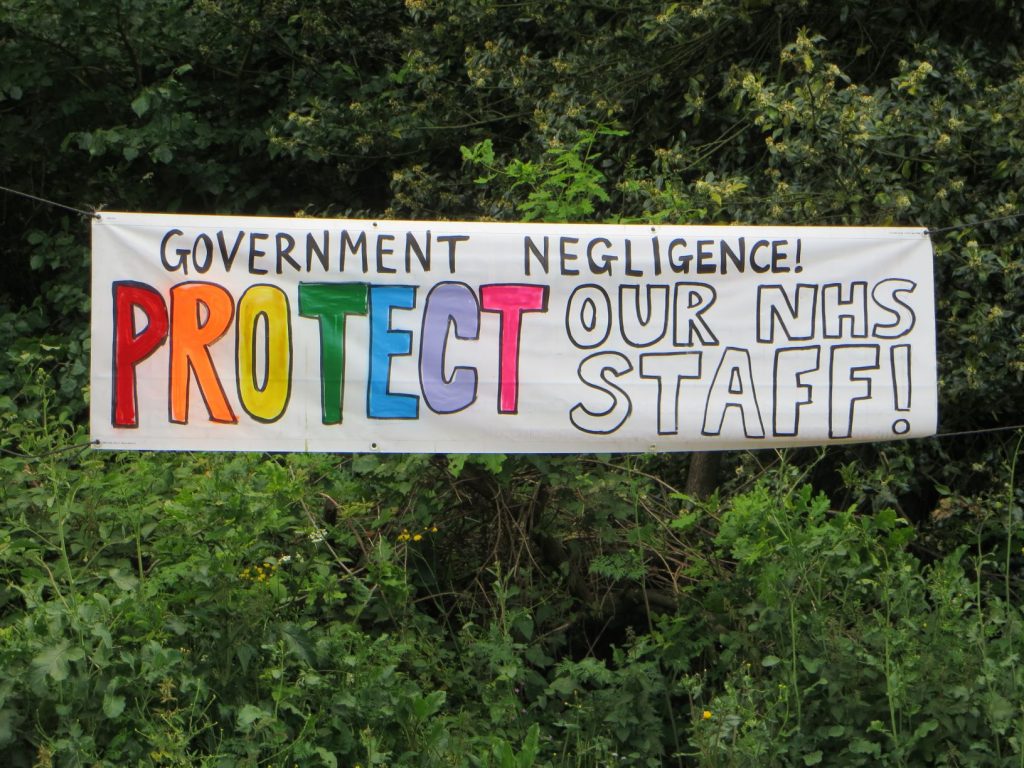
 |
||||
|---|---|---|---|---|
| Volume 50 Number 32, August 22, 2020 | ARCHIVE | HOME | JBCENTRE | SUBSCRIBE |

On Sunday, August 17, the Telegraph [1] was briefed by ministers that the government was to "abolish" Public Health England (PHE) this week, an astonishingly reckless move. On August 19, the government then announced in a press release [2] the creation of a new National Institute for Health Protection that would be "immediately bringing together PHE, NHS Test and Trace and the Joint Biosecurity Centre under the interim leadership of Baroness Dido Harding, with a single command structure and operating model to tackle the Covid-19 pandemic". The statement said, "This is the first step towards becoming a single organisation, focused on tackling Covid-19 and protecting the nation's health."
This announcement of Matt Hancock, Secretary of State for Health, has not only thrown into chaos plans for continuing to tackle the coronavirus pandemic but is clearly aimed at deflecting the blame for its own handling of the crisis by blaming PHE. At the same time, the government has thrown into jeopardy a further 5,500 jobs of people who work at PHE. This has come after months of failure by handing out contracts of testing, tracking and tracing to private sector companies and side-lining local government public health directors and staff in identifying and containing local outbreaks. Now, when it is finally forced to admit that tackling this virus needs to be locally led by public health bodies, it hands over the whole of PHE to Baroness Dido Harding, the head of NHS Test and Trace [3], the private sector service provided to the NHS in England at huge cost to the Treasury, which has consistently failed to deliver on testing, tracking and tracing throughout the crisis.

The failure to prioritise preparations for a pandemic in the months before the Covid-19 outbreak in Wuhan was a government decision, not that of the PHE. On March 22, 2019, health minister Steve Brine wrote to PHE [4] setting out 14 goals for the coming year. Pandemic preparation was not mentioned. Securing Brexit was the top priority.
Originally public health services, including dealing with public health emergencies, were part of the NHS, provided by regional and local public health authorities jointly with council public health services in each part of the country. The PHE was only created in 2013 following the end of health authorities and the creation of commissioning groups. It was a separate body led centrally by PHE and locally by Health and Well-being Boards. These services were transferred over from the NHS and were then subject to huge cuts because of the government's massive reduction in council budgets. Many of those reduced services were then handed over to privatised contractors.
In this way public health services in England have been systematically undermined since 2014 by a spending cut of about £850 million [5], affecting all services, such as tackling obesity, public health programmes and exercise, and seriously impacting survival outcomes during the coronavirus pandemic. What is more, public health specialists, and particularly those public health directors and services run by the local councils, have been sidelined and frustrated that their voices were not being heard while key decisions were being taken.
The issue is not to be diverted by the government's attempt to hide its own responsibility for the massive failures by this move to blame PHE. It is also a blatant cover by the government to place these services firmly in the hands of private companies, who have already exposed their track record as one of maximising their profits out of the crisis at the expense of public health and the well-being of the people. It is another move of a callous and dangerous character during the coronavirus pandemic that is seeing the government go from one reckless decision to another, "piling risk upon risk as we head into a dangerous winter" [6].
Notes
1. "Farewell to Public Health England, and good riddance", the
Telegraph, August 17
https://www.telegraph.co.uk/opinion/2020/08/16/farewell-public-health-england-good-riddance/
2. "Government creates new National Institute for Health
Protection"
https://www.gov.uk/government/news/government-creates-new-national-institute-for-health-protection
3. NHS Test and Trace (Wikipedia)
All components - administering tests, processing samples in laboratories, and
contact tracing - are contracted to private companies, with logistic support
from the army. Multinational consultants Deloitte handle testing logistics,
including collection of statistics, and in turn appointed outsourcing companies
Serco, Mitie, G4S and Sodexo, together with the Boots pharmacy chain, to run
drive-through test centres. Deloitte also co-ordinates three new centres known
as Lighthouse Labs where samples are processed, involving pharmaceutical
companies GlaxoSmithKline and AstraZeneca, the army, Amazon and Boots.
4. Letter of Health Minister Steve Brine to Duncan Selbie, Chief Executive
Public Health England, March 22, 2020
https://assets.publishing.service.gov.uk/government/uploads/system/uploads/attachment_data/file/789194/phe-priorities-in-health-and-care-2019-2020-letter.pdf
5. The Progressive Policy Think Tank
https://www.ippr.org/blog/public-health-cuts
6. "Matt Hancock crashes from one unforced error to the next without
counting the cost", the Guardian, August 21
https://www.theguardian.com/society/2020/aug/21/matt-hancock-abolishing-public-health-england